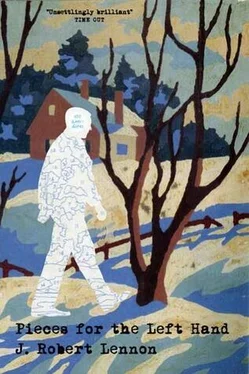Since then we have always, after eating at the diner, commented generously on the high quality of our food.
A man we know, whose friends are few and not especially close, works as an inspector of industrial machinery, a job that involves much travel and which rarely brings him into contact with others. Among the tools of his trade is a voice-activated tape recorder, with which he records his comments and recommendations about the machinery he inspects. The tapes are transcribed by a secretary he rarely sees and the transcriptions returned to him for editing into a formal report.
One particularly hectic week, our acquaintance lost his tape recorder, along with the tape inside, which held his notes from a recent inspection. After several days of searching, he was forced to buy a new recorder and schedule another inspection of the same factory.
A few days before he was to reinspect the factory, he found his old recorder: it had fallen into the plastic cubbyhole on the driver’s-side door of his car, and been hidden there by a folded map. Relieved, he sent the tape to his secretary and canceled the new appointment.
Soon he received the transcription of the missing tape. His notes, as expected, were intact, but attached to them were several pages of gibberish, which after long consideration he identified as his own thoughts, the ones he’d had during the past week of silent drives to inspection sites. He realized that his tape recorder must have been turned on when he dropped it, and that its voice-activation mechanism had sprung into action each time he spoke in the car. Evidently he had been talking to himself, something he never knew he was doing. Still more surprising was the nature of his spoken thoughts: they were expressions of pure melancholy, of longing, of dread at the prospect of the empty, lonesome days before him. One entire page consisted of the phrase “I have no friends,” repeated over and over.
He has since made an effort to strengthen his friendships; indeed, it is this very effort that allowed us to hear his story, as he shared it with us over a dinner he made himself in his immaculate and empty house. Unfortunately, intimacy does not come naturally to our acquaintance, and the evening grew very uncomfortable after the telling of his story, and we went home far earlier than expected. Since then we have tried to think of a woman we could introduce him to, but so far have failed to come up with anyone who might like him. We did suggest that he call his secretary, who after all has heard his voice more than anyone else he knows. But he says that she knows him too well. About this he may be right.
A café opened in our town which specialized in unusual gourmet coffees from estates throughout Central and South America, Africa, India and the Pacific Islands. The entrepreneurs who ran the café hired a grizzled adventurer and self-proclaimed coffee expert, whose job was to fly once a year to the oldest and most remote estates, and gather the coffees that would be offered at the café for the rest of the year. The expert was paid handsomely and reimbursed for his considerable expenses, but his work paid off: the café became one of the most popular and lucrative businesses in our town, and the entrepreneurs celebrated their success by reinvesting their profits in more treacherous and far-ranging coffee-research expeditions.
One morning several years into the café’s existence, an electrical fire claimed the rear half of the building it occupied. Though the seating area was unharmed, the storeroom was completely consumed, along with all the coffee the expert had just brought back from his journey to Kenya, Guatemala and the Oaxaca region of Mexico. For days, the rich smell of roasting coffee filled the air, and the remaining supply quickly dwindled to the edge of nothing.
The café had reached a crisis, and the entrepreneurs had to take drastic measures. They went out to the supermarket and bought several cases of its store-brand beans, then brought them back, ground them and served them to their regular customers.
The entrepreneurs were surprised to learn that, while the customers noticed the difference, they didn’t seem to care. After a few weeks, the owners fired the expert. They explained that while the contrast between the coffees was drastic, and they would miss the delicious blends from all over the world, they preferred to hang on to their money. From then on, they said, they would buy their coffee from the supermarket.
The expert, already known in our town long before the entrepreneurs arrived as a misanthropic crackpot, responded by burning the café entirely to the ground. He was captured with his matches and gas can at the supermarket, which he had planned to torch next.
From prison, he told reporters that the well-documented humiliations and privations of incarceration paled in comparison to jail coffee, which was very nearly the worst he had ever tasted.
In the early days of the Cold War, the United States government spent significant amounts of money testing the effects of nuclear explosions on buildings, roads, cars, trains, household items and, ultimately, living beings. Since no military personnel, of course, were willing to sacrifice their own lives in the tests, a substitute for soldiers had to be found, and the government soon settled on pigs for this purpose.
To make the tests as authentic as possible, Army scientists ordered that military uniforms be fitted to the pigs, and a local company was contracted to do this. It happened that the company was owned by my future father-in-law, a retired Army officer who had fought in the war and had dedicated his civilian life to textile manufacture, the family business. The project was secret, and the uniforms were to be made in pieces by employees working alone. The pieces would be assembled by my father-in-law personally, and no one else was to see the finished product.
My father-in-law, however, found the completed uniforms to be quite sharp, and got the idea that one would look good on his beloved pet, a German shepherd named Ace. He particularly liked a certain detail of the uniforms — an embroidered name patch with the word PIG stitched onto it — because among Ace’s distinguishing characteristics was a tendency to eat messily and in haste. He ordered his employees to make enough material for a couple of extra uniforms, which he sewed together at home, tailoring them perfectly to Ace’s measurements. Whenever the two went out, Ace wore his Army uniform, and occasionally my father-in-law would pin a few of his own medals onto the dog’s chest, if the dog had been especially obedient or kind on that day.
It wasn’t long before an active officer from the base saw my father-in-law and Ace in a bar together, and when they returned home they found two military police awaiting them. The MPs confiscated the uniform and my father-in-law was reprimanded severely; in addition he was subjected to a harsh grilling and forced to provide a list of everyone in town who might have seen the uniform. From then on, whenever he was seen in town with Ace, the dog wore nothing but his collar.
Years later, when my wife’s parents moved closer to our area, my father-in-law brought the duplicate uniform with him. Since Ace’s death he has had several dogs, all German shepherds of Ace’s approximate size, all of whom he named Ace and who have all, on occasion, worn the forbidden uniform.
Recently he and the latest Ace met a retired Army officer who was once stationed at the base where the nuclear testing was to have taken place. My father-in-law boldly told him where the dog’s uniform had come from. To everyone’s surprise, the officer remembered my father-in-law, and told him that he had, in the old days, been regarded as a suspected spy. The officer further admitted that there had been a thick file at the base with his name on it.
Читать дальше










